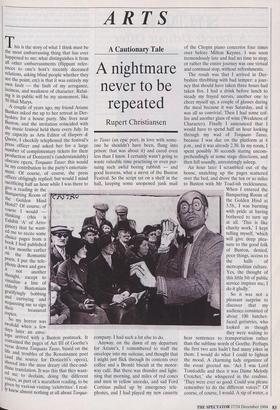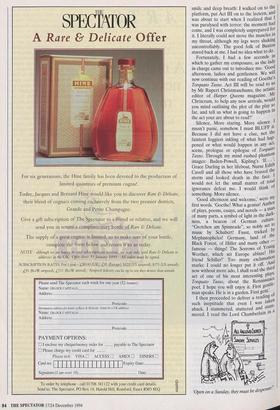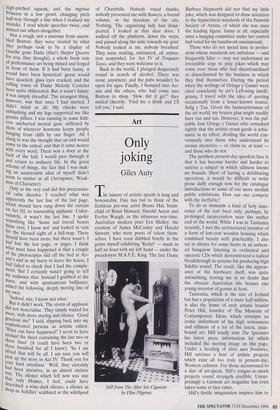ARTS
A Cautionary Tale
A nightmare never to be repeated
Rupert Christiansen
This is the story of what I think must be the most embarrassing thing that has ever happened to me: what distinguishes it from all other embarrassments (flippant refer- ences to one's host's recently deceased relations, asking blind people whether they see the point, etc) is that it was entirely my own fault — the fault of my arrogance, laziness, and weakness of character. Relat- ing it in public will be my atonement, like 50 Hail Marys. A couple of years ago, my friend Ariane Bankes asked me up to her retreat in Der- byshire for a house party. She lives near Buxton, and the invitation coincided with the music festival held there every July. In InY capacity as Arts Editor of Harpers & Queen, I cheekily telephoned the festival's press officer and asked her for a large number of complimentary tickets for their Production of Donizetti's (understandably) obscure opera, Torquato Tasso: this would be my contribution to the party's entertain- ment. Of course, of course, the press officer obligingly replied: but would I mind sacrificing half an hour while I was there to give a reading in the Banqueting Room of Hotel? Golden Hind tiotel? Of course, of Course I would thinking (this is Exhibit 'A' of Arro- gance) that he want- ed me to recite some choice pages from a hook I had published a few months earlier °n the Romantic Poets. I put the tele- phone down and gave it not another thought, except to visualize a line of elderly Buxtonians gratifyingly bobbing _and curtsying and requesting me to sign their treasured Copies.
So my horror was twofold when a few days later an enve- lope arrived with a Buxton postmark. It contained the pages of Act III of Goethe's verse drama Torquato Tasso, based on the 'de and troubles of the Renaissance poet (and the source for Donizetti's opera), shoved into the most dreary old thee-and- thine translation. It was this that they want- !d me to declaim, doing the different vOices, as part of a marathon reading, to be given by various visiting 'celebrities'. I real- 1Y 'mew almost nothing at all about Torqua- to Tasso (an epic poet, in love with some- one he shouldn't have been, flung into prison: that was about it) and cared even less than I knew. I certainly wasn't going to waste valuable time practising or even pur- suing such awful boring rubbish — and good heavens, what a nerve of the Buxton Festival. So the script sat on a shelf in the hall, keeping some unopened junk mail company. I had such a lot else to do.
Anyway, on the dawn of my departure for Ariane's, I remembered to stuff the envelope into my suitcase, and thought that I might just flick through its contents over coffee and a Brontë biscuit at the motor- way café. But there was thunder and light- ning that morning, and miles of red cones and men in yellow anoraks, and sad Ford Cortinas pulled up by emergency tele- phones, and I had played my new cassette of the Chopin piano concertos four times over before Milton Keynes. I was soon tremendously late and had no time to stop; or rather the entire journey was one virtual and continual stop, without refreshments.
The result was that I arrived in Der- byshire throbbing with bad temper: a jour- ney that should have taken three hours had taken five. I had a drink before lunch to steady my frayed nerves, another one to cheer myself up, a couple of glasses during the meal because it was Saturday, and it was all so convivial. Then I had some cof- fee and another glass of wine (Weakness of Character). Finally I announced that I would have to spend half an hour looking through my wad of Torquato Tasso, because I was due on the platform at 4 p.m., and it was already 2.30. In my room, I spent possibly 30 seconds staring uncom- prehendingly at some stage directions, and then fell soundly, unresistingly asleep.
An hour later I scrambled out of the house, snatching up the pages scattered over the bed, and drove the ten or so miles to Buxton with Mr Toad-ish recklessness.
When I entered the Banqueting Room of the Golden Hind at 3.58., I was bursting with pride at having bothered to tum up at all. 'This is like charity work,' I kept telling myself, 'which will give deep plea- sure to the good folk of Buxton, denied, poor things, access to the halls of metropolitan culture. Yes, the thought of this little bit of public service inspires me; I do it gladly.'
So it was not a pleasant surprise to discover that my audience consisted of about 100 hatchet- faced geriatrics, who looked as though they were waiting to hear sentences to transportation rather than the sublime words of Goethe. Perhaps the first two acts hadn't had many jokes in them: I would do what I could to lighten the mood. A charming lady organizer of the event greeted me. 'Act I was Lord Tomfoddle and then it was Dame Melody Crotchet,' she whispered in the coulisse. `They were ever so good. Could you please remember to do the different voices?' Of course, of course, I would. A sip of water, a smile and deep breath: I walked on to the platform, put Act III on to the lectern, and was about to start when I realized that I was paralysed with terror: the moment had come, and I was completely unprepared for it. I literally could not move the muscles in my throat, although my legs were shaking uncontrollably. The good folk of Buxton stared back at me. I had no idea what to do.
Fortunately, I had a few seconds in which to gather my composure, as the lady in charge came out to introduce me. 'Good afternoon, ladies and gentlemen. We will now continue with our reading of Goethe's Torquato Tasso. Act III will be read to us by Mr Rupert Christmaschums, the artistic editor of Harper Queens magazine. Mr Chriscrum, to help any new arrivals, would you mind outlining the plot of the play a° far, and tell us what is going to happen In the act your are about to read?' Silence, More staring. More silence. I i musn't panic, somehow I must BLUFF it. Because I did not have a clue, not the faintest foggiest inkling of what had hap- pened or what would happen in any act, scene, prologue or epilogue of Torquato Tasso. Through my mind rushed phantora, images: Baden-Powell, Kipling's
Grace Darling in her lifeboat, Nurse EMI' Cavell and all those who have braved the storm and looked death in the face. I would not let the small matter of total ignorance defeat me. I would think of something. More silence.
`Good afternoon and welcome,' were tnY first words. 'Goethe! What a genius! Author of plays, poems, essays, and novels — a marl of many parts, a symbol of light in the dark- ness, a beacon of German culture. "Gretchen am Spinnrade", so nobly set to music by Schubert! Faust, tricked by Mephistopheles! Germany, land of the Black Forest, of Hitler and many other famous — things! The Sorrows of Young Werther, which set Europe ablaze! 11P. friend Schiller!' Too many exclamation, marks: I could no longer put it off. thud now without more ado, I shall read the thud act of one of his most interesting Plays' Torquato Tasso, about the Renaissance poet. I hope you will enjoy it. First gen,r1e- man speaks. He is in a garden. First gent. ,
I then proceeded to deliver a reading °I such ineptitude that even I was taken aback. I stammered, stuttered and stunt mered. I read the Lord Chamberlain in a
`Open on a Sunday, they must be desperate!' high-pitched squeak, and the ingenue Princess in a low growl, changing pitch half-way through a line when I realised my mistake. I read whole speeches twice, and missed out others altogether. Not a cough, not a murmur from assem- bled Buxton: they were riveted by what they perhaps took to be a display of Goethe gone Dada (that's Harper Queens for you, they thought), a whole fresh vein of performance art being mined and forged in front of them. If it had been funny, it would have been hysterical: geese would have quacked, glass eyes cracked, and the rolling tones of Dame Melody Crotchet been quite obliterated. But it wasn't funny; it was simply dreadful. The strangest thing, however, was that once I had started, I didn't mind at all. My cheeks were unblushing and my legs supported me like granite pillars. I was running in some hith- erto uncharted mental gear, stiffened by shots of whatever hormone keeps people hanging from cliffs by one finger. All I Clung to was the thought that an end would come to the ordeal, and that it came nearer with every word. There was a door at the back of the hall. I would pass through it and return to ordinary life. In the great scheme of things, the fact that I was mak- ing an unutterable idiot of myself didn't seem to matter at all (Arrogance, Weak- ness of Character). Only at the very end did this preternatu- ral calm dissolve. I reached what was apparently the last line of the last page, which should have rung down the curtain On Act III, to resounding applause. Unfor- tunately, it wasn't the last line. I spoke something like 'Some sad travail besets thine eyes, I know not' and looked in vain for the blessed sight of a full-stop. There should have been more, but there wasn't: I had lost the last page, or pages. I think what must have happened is that a couple of the photocopies slid off the bed at Ari- ane's and in my hurry to leave the house, I had failed to check that I had the comple- ment. But I certainly wasn't going to tell MY audience that. Instead I grabbed at the muse, and with spontaneous brilliance, added the following, deeply moving line of my own: `Indeed, sire, I know not what.' But it didn't work. The storm of applause did not materialise. They simply waited for more, with more staring and silence. 'Good gracious me!' I said, slipping back into my sophisticated persona as artistic editor. W. hat can have happened? I seem to have Mislaid the sheet containing the last two or three lines' (it could have been two or three hundred for all I knew). 'So I am afraid that will be all. I am sure you will Pick up the story in Act IV. Thank you for your kind attention.' Well, they certainly had been attentive, in an almost sinister waY. The silence which fell now was one that only Homer, I feel, could have described: a wine-dark silence, a silence as deep as Achilles' scabbard or the whirlpool of Charybdis. Nobody voted thanks, nobody presented me with flowers, a bound volume, or the freedom of the city. Nothing. The organizing lady had disap- peared. I looked at that dear door, I walked off the platform, down the steps, and passed along the aisle towards my goal. Nobody looked at me, nobody breathed. They were waiting, entranced, all anima- tion suspended, for Act IV of Torquato Tasso, and they were welcome to it.
Back in the world, I plunged desperately round in search of alcohol. There was none, anywhere, and the pubs wouldn't be open for ages. Finally, I bumped into Ari- ane and the others, who had come into Buxton to shop. 'How did it go?' they smiled cheerily. 'Find me a drink and I'll tell you,' I said.












































































































 Previous page
Previous page